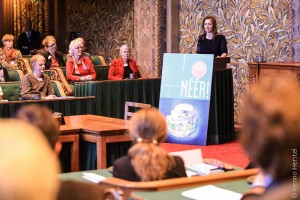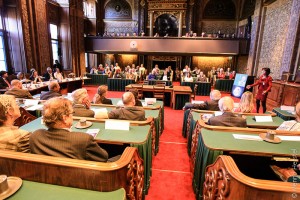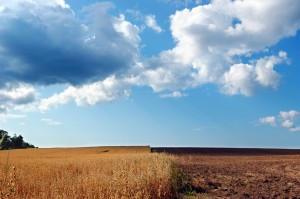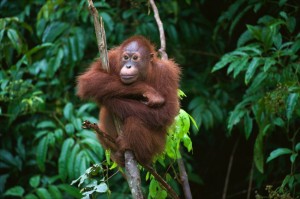Worldlog Settimana 23 – 2013
La settimana scorso ho presentato la mia prima raccolta scientifica col titolo Méér (Di Più) nel Senato. Scienziati che hanno dato il loro contributo alla nuova raccolta, hanno dato una serie di analisi che invocano di scegliere i limiti della terra come punto dio partenza per le nostre azioni. Méér è una guida per i politici, governatori e cittadini per rendere possibile un cambiamento radicale verso altre, sostenibili scelte politiche.
In Méér Raccolgo punti di vista scientifici che creano una mappatura della crisi del momento e per aiutare di risolverli in modo coeso. I contributi provengono da scienziati indipendenti che si preoccupano del futuro dell’uomo, gli animali, la natura e l’ambiente e sostengono da vari punti di vista soluzioni praticabili per la crisi.
Questo è l’informazione sul risvolto della sopra coperta.
Méér! è diventato il tema centrale della nostra società: più di tutto e più di quanto ce n’è. Negli ultimi decenni di prosperità senza precedenti, ha preso piede la convinzione che la crescita della nostra economia non solo è senza limiti, ma è anche la base per la felicità e il benessere. Dove l’economia una volta era la scienza della produzione e la distribuzione di beni e di risorse scarse, è ora quasi esclusivamente si concentrata su denaro e questioni monetarie. La crisi sistemica che si è presentata nel 2008 come una crisi bancaria, adesso si manifesta come crisi monetaria. Ed è chiaro che abbiamo per di più la crisi della biodiversità, la crisi climatica, la crisi alimentare mondiale e altri problemi di scarsità che minacciano la prosperità e il benessere fino in fondo.
Ci siamo impegnati questa settimana per un’agricoltura sostenibile. Perché l’agricoltura sostenibile non deve essere ostacolato dalle nuove pretese che l’Unione Europea pone alla registrazione di nuove varietà vegetali. Fortunatamente il Parlamenta ha sostenuto in modo unanime una nostra mozione!
La Commissione Europea ha fatto una proposta nella quale le regole sulla produzione e il commercio di sementi saranno cambiati. Essa stabilisce requisiti severi per semi che possono essere utilizzato in agricoltura. Tutte le varietà vegetali devono, secondo questa proposta, essere registrati, e la registrazione costa tanti soldi. La proposta europea ha causato molta agitazione negli agricoltori urbani, coltivatori di orti e dagli agricoltori biologici e dagli innestatori. Loro temevano che potessero solo usare sementi registrate e che lo scambio di sementi non sarebbe più permesso.
Nella proposta definitiva risultava che i privati non dovrebbero seguire le nuove regole. Anche piccoli innestatori e tipi di sementi tradizionali non sarebbero tenuti a rispettare i nuovi obblighi di registrazione. Noi riteniamo che i requisiti per la registrazione della proposta siano troppo rigidi, e che possono essere un ostacolo per l’agricoltura biologica.
Pertanto abbiamo comunque presentato una mozione nella quale chiediamo il governo di mettere al primo posto nelle trattative sulla proposta della Commissione Europea gli interessi dei piccoli innestatori e l’agricoltura biologica e proteggere questi interessi.
Cattive notizie per la giungla in Brasile. Ricerca mostra che la deforestazione in Brasile provoca dei semi degli alberi più piccoli.
Firma qui per farsi che 1,2 milioni di ettari di habitat degli orangutang su Sumatra possono essere salvati. Questo territorio è sotto diretto pericolo da parte dell’industria dell’olio di palma.
Alla prossima settimana! Marianne
Last week, I presented my new scientific volume titled More! to the Upper House. Scientists who contributed to the new volume, presented a range of analyses which urge us to base our acts on the borders of the earth. More! is a guideline for politicians, policymakers and civilians to make a radical change to other and sustainable policy choices.
In More! I have compiled scientific insights which analyse the current crises and help solve them in conjunction with each other. The contributions come from independent scientists who are concerned with the future of humans, animals, nature and the environment, and advocate practicable solutions for the crises from various angles.
This is the information on the back cover:
More! has become the key theme of our community: more of everything and more of what is available. During the past decade of unprecedented wealth, we started to believe that the growth of our economy is not only unlimited, but also a condition for happiness and wealth. Where economy was first the science of production and distribution of scarce goods and means, it is now almost exclusively about money and monetary issues. The system crisis that first presented itself in 2008 as a banking crisis, is now manifesting itself as a monetary crisis. And additionally, there clearly is a biodiversity crisis, a climate crisis, a world food crisis and other scarcity issues, which seriously threaten our welfare and wealth.
We made an effort for sustainable agriculture this week. Because sustainable agriculture should not be hindered by new regulations on the registration of plant varieties, set by the European Union. Fortunately, the Upper House unanimously seconded the motion!
The European Commission made a proposal to amend legislation on the production and marketing of seeds. It contains strict rules on seeds that are permitted to be used in agriculture. In accordance with the proposal all plant varieties must be registered, but registrations are expensive. The European proposal has caused a great deal of unrest among city farmers, vegetable gardeners, and among organic farmers and breeders. They feared that they would be permitted to only use registered seeds, and that the exchange of seeds would be disallowed.
The definitive proposal showed that the new legislation does not apply to private persons. Small seed breeders and traditional seed varieties would not have to comply with any new registration rules. We believe that the registration rules in the proposal are too strict, and could be an obstruction for organic farmers.
That is why the Party for the Animals called for a motion, requesting the government to prioritize the interests of small breeders and organic farmers in the negotiations about the European Commission’s proposal, and to protect their interests.
Bad news for the rainforest in Brazil. Research suggests that rainforest deforestation in Brazil leads to seed shrinkage.
Sign here to save 1.2 million acres of habitat of the orangutans on Sumatra. This area is endangered by the palm oil industry.
Until next week! Marianne



